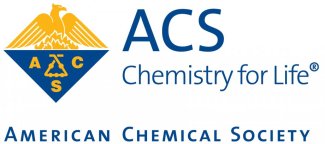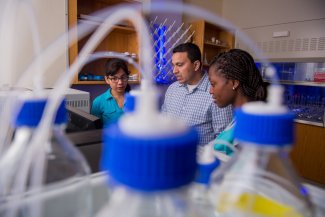Our programs train and equip students students to conduct sound research and engage the challenges of our modern day. Comprised of 13 faculty members, we provide early research opportunities with faculty and mentors who help guide students path to discovery. Our programs provide students with opportunities to gain the necessary knowledge and skill sets employers are highly seeking. Recent graduates have gone on to work in the chemical/biochemical industry or research labs (such as 3M, Archer Daniels Midland, Poet, True Shrimp, Mayo Clinic), attend medical school or dental school, pursue graduate degrees and teach at the high school and university levels.
Accreditation
Our B.S. programs are certified by the national accrediting bodies. The B.S. chemistry degree program is certified by the American Chemical Society (ACS). The B.S. biochemistry degree program is one of only 101 in the country (and the only one in South Dakota) accredited by the American Society for Biochemistry and Molecular Biology (ASBMB).


Hands On
A major emphasis of the undergraduate educational experience for our chemistry, biochemistry and chemical education majors is the opportunity to participate in federally funded, frontier research with faculty in the department, at national laboratories and/or other academic institutions and industry. Not only does this experience give students a genuine opportunity to practice chemistry - characterizing a molecule and studying its function, understanding the properties of a new material or perhaps performing an experiment that has never been performed before - it provides the opportunity to learn about their creative abilities in an entirely different way than a traditional classroom/laboratory experience can provide.
A "Big" Small Department
In many ways we offer our majors the best of what both large research universities and smaller four-year liberal arts institutions can provide. Our department is large enough to provide numerous research and internship opportunities to perform them. At the same time, our department is also small enough to provide direct and regular contact with our faculty. This is a combination that distinguishes our program from any other in South Dakota or the region.
Advising
From the time students come for New Student Orientation in the summer, to the time they graduate, they will have an academic advisor from the department of chemistry and biochemistry, who will be able to help them register for classes and also help them navigate their undergraduate career.
A Path to Your Future
Our undergraduates regularly present the results of their research at regional, national, and international meetings, which provide a wonderful opportunity to learn from some of the most notable chemists of our day. Our undergraduates are co-authors on papers published from their research and in many cases, they helped write those papers.
State-of-the-Art Facilities
Our programs are housed in the Avera Health and Science Center. It is here where most of the classroom and laboratory work that are integral components of our programs take place. This $51 million research and instructional facility was completed in December 2010. The Department of Chemistry and Biochemistry is home to the Campus NMR Core Facility and Core Campus Mass Spectrometry Facility.

Small Classes
Lecture classes are taught by professors and emphasize student-faculty interaction. Lectures for majors have no more than 36 students and instructional labs have no more than 24 students. Our faculty pride themselves on an open-door policy for their students. Also, we are large enough to have equipment not always available at smaller schools, and students get to use it. Our curriculum for the first two years is designed exclusively for department majors and honors students. The small class size allows hands-on, in-depth learning.
Scholarships
Our majors compete for nearly $40,000 in scholarships, including some exclusively for freshmen and some of the largest scholarships at SDState.

